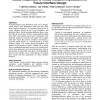Free Online Productivity Tools
i2Speak
i2Symbol
i2OCR
iTex2Img
iWeb2Print
iWeb2Shot
i2Type
iPdf2Split
iPdf2Merge
i2Bopomofo
i2Arabic
i2Style
i2Image
i2PDF
iLatex2Rtf
Sci2ools
122
click to vote
CHI
2007
ACM
2007
ACM
Social responses to virtual humans: implications for future interface design
Do human-human social interactions carry over to humanvirtual human social interactions? How does this affect future interface designers? We replicated classical tests of social influence known as the social facilitation and inhibition effects. Social facilitation/inhibition theory states that when in the presence of others, people perform simple tasks better and complex tasks worse. Participants were randomly assigned to perform both simple and complex tasks alone and in the presence of either a real human, a projected virtual human, or a virtual human in a headmounted display. Our results showed participants were inhibited by the presence of others, whether real or virtual. That is, participants performed worse on the complex task, both in terms of percent correct and reaction times, when in the presence of others than when alone. Social facilitation did not occur with the real or virtual human. We discuss these results and their implications for future interface designers. Author K...
Related Content
| Added | 13 Aug 2010 |
| Updated | 13 Aug 2010 |
| Type | Conference |
| Year | 2007 |
| Where | CHI |
| Authors | Catherine A. Zanbaka, Amy Catherine Ulinski, Paula Goolkasian, Larry F. Hodges |
Comments (0)

